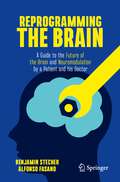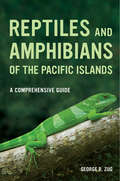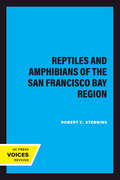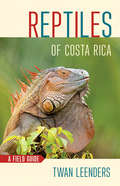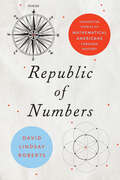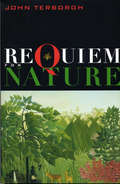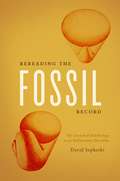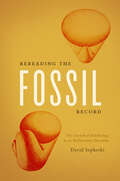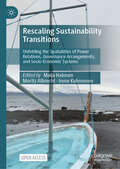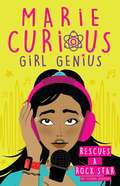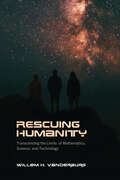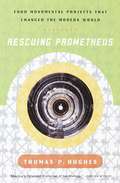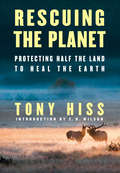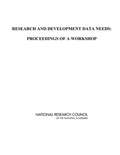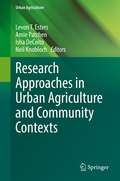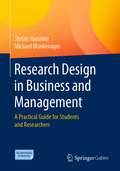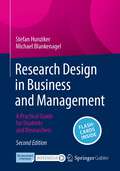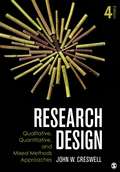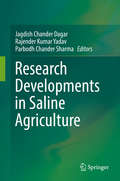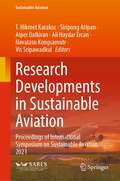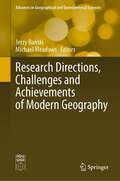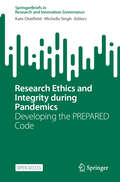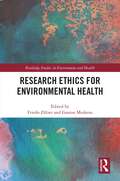- Table View
- List View
Reprogramming the Brain: A Guide to the Future of the Brain and Neuromodulation by a Patient and his Doctor
by Alfonso Fasano Benjamin StecherIn June 2021, Doctor and Patient decided that time had come to surgically implant two six-inch-long metal alloy spikes all the way through Ben’s brain. It was felt that the medications Ben was taking to control his Parkinson’s disease had become unmanageable. Back then, Ben was taking about 20 different pills a day. Each pill, if it absorbed properly, would activate the dopamine pathways in his brain and induce uncontrollable writhing movements that would last for about an hour. He would then get about 20 minutes where he’d feel somewhat normal before the slowness and tremor kicked in again. So, he’d take another pill and the cycle would repeat.After months of adjusting his medication and finding just the right settings on his deep brain stimulator, it was decided, for the first time ever in a clinical trial in North America, to flip on the adaptive settings.This is the story of how that decision was made and what happened next.
Reptiles and Amphibians of the Pacific Islands
by George R. ZugThe Pacific is not only the world's largest body of water; its vast expanse also includes an extraordinary number and diversity of oceanic islands, from Palau and the Marianas east of the Philippines to Cocos Island and the Galápagos west of the Americas. The isolation of these islands and the extreme distances between them long prevented scientists from studying their floras and faunas in a comparative context. But now George R. Zug, one of the world's foremost experts on the diverse reptiles and amphibians of the Pacific Basin, offers the first such systematic overview in more than half a century. Reptiles and Amphibians of the Pacific Islands is a compendium of frogs, lizards, snakes, and turtles living on these lands and in the adjacent waters of the oceanic islands in the tropical Pacific. The means to identify each species is included, along with entries that describe each animal's form, coloration, habitat, distribution, reproductive biology, and natural history. Color plates of more than 75 percent of the species also help to facilitate visual identification. This accessible and informative guide is the most comprehensive field guide available and will appeal to both novice sightseers and professional naturalists.
Reptiles and Amphibians of the San Francisco Bay Region (California Natural History Guides #3)
by Robert C. StebbinsThis title is part of UC Press's Voices Revived program, which commemorates University of California Press’s mission to seek out and cultivate the brightest minds and give them voice, reach, and impact. Drawing on a backlist dating to 1893, Voices Revived makes high-quality, peer-reviewed scholarship accessible once again using print-on-demand technology. This title was originally published in 1959.This title is part of UC Press's Voices Revived program, which commemorates University of California Press’s mission to seek out and cultivate the brightest minds and give them voice, reach, and impact. Drawing on a backlist dating to 1893, Voices Revived</DIV
Reptiles of Costa Rica: A Field Guide (Zona Tropical Publications)
by Twan LeendersReptiles of Costa Rica, the long-awaited companion to Amphibians of Costa Rica, is the first ever comprehensive field guide to the crocodilians, turtles, lizards, and snakes of Costa Rica. A popular destination for tourists and biologists because of its biodiversity, the country is particularly rich in reptile fauna, boasting 245 species. The sheer diversity in shapes, sizes, colors, and natural history traits of these animals is beautifully displayed in this book. Lizards range from minuscule dwarf geckos to dinosaur-like iguanids, and everything in between, while the country's snakes include tiny eyeless wormsnakes, massive boas, as well as twenty-three dangerously venomous species, which include the largest vipers in the world. Author, photographer, and conservation biologist Twan Leenders has been researching and documenting the herpetofauna of Costa Rica for nearly twenty-five years. His explorations have taken him to remote parts of Costa Rica that few people ever visit, journeys that usually find him hauling an array of photographic equipment to document his finds. In addition to including more than 1,000 photographs, detailed black and white scientific illustrations, and range maps, this book also features paintings of anole dewlaps, a key identification feature for that very complex group of lizards. This new field guide will enable the reader to identify all species, while also providing a wealth of information about natural history, predation, breeding strategies, habitat preferences, and conservation of Costa Rica's reptile fauna.
Republic of Numbers: Unexpected Stories of Mathematical Americans through History
by David Lindsay RobertsThis fascinating narrative history of math in America introduces readers to the diverse and vibrant people behind pivotal moments in the nation's mathematical maturation.Once upon a time in America, few knew or cared about math. In Republic of Numbers, David Lindsay Roberts tells the story of how all that changed, as America transformed into a powerhouse of mathematical thinkers. Covering more than 200 years of American history, Roberts recounts the life stories of twenty-three Americans integral to the evolution of mathematics in this country. Beginning with self-taught Salem mathematician Nathaniel Bowditch's unexpected breakthroughs in ocean navigation and closing with the astounding work Nobel laureate John Nash did on game theory, this book is meant to be read cover to cover. Revealing the marvelous ways in which America became mathematically sophisticated, the book introduces readers to Kelly Miller, the first black man to attend Johns Hopkins, who brilliantly melded mathematics and civil rights activism; Izaak Wirszup, a Polish immigrant who survived the Holocaust and proceeded to change the face of American mathematical education; Grace Hopper, the "Machine Whisperer," who pioneered computer programming; and many other relatively unknown but vital figures. As he brings American history and culture to life, Roberts also explains key mathematical concepts, from the method of least squares, propositional logic, quaternions, and the mean-value theorem to differential equations, non-Euclidean geometry, group theory, statistical mechanics, and Fourier analysis. Republic of Numbers will appeal to anyone who is interested in learning how mathematics has intertwined with American history.
Requiem for Nature
by John TerborghFor ecologist John Terborgh, Manu National Park in the rainforest of Peru is a second home; he has spent half of each of the past twenty-five years there conducting research. Like all parks, Manu is assumed to provide inviolate protection to nature. Yet even there, in one of the most remote corners of the planet, Terborgh has been witness to the relentless onslaught of civilization.Seeing the steady destruction of irreplaceable habitat has been a startling and disturbing experience for Terborgh, one that has raised urgent questions: Is enough being done to protect nature? Are current conservation efforts succeeding? What could be done differently? What should be done differently? In Requiem for Nature, he offers brutally honest answers to those difficult questions, and appraises the prospects for the future of tropical conservation. His book is a clarion call for anyone who cares about the quality of the natural world we will leave our children.Terborgh examines current conservation strategies and considers the shortcomings of parks and protected areas both from ecological and institutional perspectives. He explains how seemingly pristine environments can gradually degrade, and describes the difficult social context -a debilitating combination of poverty, corruption, abuses of power, political instability, and a frenzied scramble for quick riches -in which tropical conservation must take place. He considers the significant challenges facing existing parks and examines problems inherent in alternative approaches, such as ecotourism, the exploitation of nontimber forest products, "sustainable use," and "sustainable development."Throughout, Terborgh argues that the greatest challenges of conservation are not scientific, but are social, economic, and political, and that success will require simultaneous progress on all fronts. He makes a compelling case that nature can be saved, but only if good science and strong institutions can be thoughtfully combined.
Rereading the Fossil Record: The Growth of Paleobiology as an Evolutionary Discipline
by David SepkoskiRereading the Fossil Record presents the first-ever historical account of the origin, rise, and importance of paleobiology, from the mid-nineteenth century to the late 1980s. Drawing on a wealth of archival material, David Sepkoski shows how the movement was conceived and promoted by a small but influential group of paleontologists and examines the intellectual, disciplinary, and political dynamics involved in the ascendency of paleobiology. By tracing the role of computer technology, large databases, and quantitative analytical methods in the emergence of paleobiology, this book also offers insight into the growing prominence and centrality of data-driven approaches in recent science.
Rereading the Fossil Record: The Growth of Paleobiology as an Evolutionary Discipline
by David SepkoskiRereading the Fossil Record presents the first-ever historical account of the origin, rise, and importance of paleobiology, from the mid-nineteenth century to the late 1980s. Drawing on a wealth of archival material, David Sepkoski shows how the movement was conceived and promoted by a small but influential group of paleontologists and examines the intellectual, disciplinary, and political dynamics involved in the ascendency of paleobiology. By tracing the role of computer technology, large databases, and quantitative analytical methods in the emergence of paleobiology, this book also offers insight into the growing prominence and centrality of data-driven approaches in recent science.
Rescaling Sustainability Transitions: Unfolding the Spatialities of Power Relations, Governance Arrangements, and Socio-Economic Systems
by Maija Halonen Moritz Albrecht Irene KuhmonenThis Open Access book explores sustainability transitions with a focus on their influence on the relationships between cores and peripheries, the rural and the urban, and the large and the small-scale. The societal changes induced by sustainability transitions are expected to assemble as a variegated and heterogeneous process reproduced by different spatial contexts and scales. Hence, the practical solutions and impacts of processes framed as sustainability transitions are expected to vary between different localities in terms of their natural, material, or human resources, the heritage of the development, their power and market relations, virtual and physical connections as well as shifting individual rationalities – within and across certain socio-economic spaces. To highlight these socio-spatial processes, their alignments, frictions and contradictions for sustainability transitions, this book and its contributions call for an increased engagement in the scalar aspects of sustainability transitions and their governance. The authors argue that rescaling follows from two observations on the extant literature concerning sustainability transitions. Firstly there is a call for a stronger engagement of sustainability transitions research with questions of place and relocalization practices, their embedded power relations, but also questions on small-scale trajectories for the territorial and economic materializations in terms of production and market reach as an alternative to the large-scale dominance of resource exploitation and use. Secondly there is a call for increased attention to the relational processes and ontological framing that reproduce mobilities and scalar shifts in governance arrangements.
Rescues a Rock Star: Book 2 (Marie Curious, Girl Genius #2)
by Chris Edison50% Girl + 50% Genius = 100% Awesome! A brilliant new series with a heroine who uses her smarts - and her girl squad - to save the world from evil, one invention at a time. Marie is reunited with her geek girl friends when Sterling Vance invites them to present their winning invention at a big tech fair in London. There, the four young female scientists befriend a young pop star, whose tour Vance is sponsoring. She's unhappy with the way her management is making her try to be someone she's not. When the pop star disappears on the eve of her high-tech world tour, it's up to Marie and her friends to track her down so the show can go on.
Rescuing Entangled Whales (Fountas & Pinnell Gold LLI #Level R)
by Laura JohnsonRescuing Entangled Whales Author: Laura T. Johnson
Rescuing Humanity: Transcending the Limits of Mathematics, Science, and Technology
by Willem H. VanderburgIn Rescuing Humanity, Willem H. Vanderburg reminds us that we have relied on discipline-based approaches for human knowing, doing, and organizing for less than a century. During this brief period, these approaches have become responsible for both our spectacular successes and most of our social and environmental crises. At their roots is a cultural mutation that includes secular religious attitudes that veil the limits of these approaches, leading to their overvaluation. Because their use, especially in science and technology, is primarily built up with mathematics, living entities and systems can be dealt with only as if their "architecture" or "design" is based on the principle of non-contradiction, which is true only for non-living entities. This distortion explains our many crises. Vanderburg begins to explore the limits of discipline-based approaches, which guides the way toward developing complementary ones capable of transcending these limits. It is no different from a carpenter going beyond the limits of his hammer by reaching for other tools. As we grapple with everything from the impacts of social media, the ongoing climate crisis, and divisive political ideologies, Rescuing Humanity reveals that our civilization must learn to do the equivalent if humans and other living things are to continue making earth a home.
Rescuing Prometheus: Four Monumental Projects that Changed Our World
by Thomas P. Hughes"A rare insight into industrial planning on a huge scale...Excellent." --The EconomistRescuing Prometheus is an eye-opening and marvelously informative look at some of the technological projects that helped shape the modern world. Thomas P. Hughes focuses on four postwar projects whose vastness and complexity inspired new technology, new organizations, and new management styles. The first use of computers to run systems was developed for the SAGE air defense project. The Atlas missile project was so complicated it required the development of systems engineering in order to complete it. The Boston Central Artery/Tunnel Project tested systems engineering in the complex crucible of a large scale civilian roadway. And finally, the origins of the Internet fostered the collegial management style that later would take over Silicon Valley and define the modern computer industry. With keen insight, Hughes tells these fascinating stories while providing a riveting history of modern technology and the management systems that made it possible.From the Trade Paperback edition.
Rescuing the Planet: Protecting Half the Land to Heal the Earth
by Tony Hiss"As clear a picture of humanity's impact on earth's natural environment as any ever written." --E. O. Wilson (from the Introduction)An urgent, resounding call to protect 50 percent of the earth's land by 2050--thereby saving millions of its species--and a candid assessment of the health of our planet and our role in conserving it, from the award-winning author of The Experience of Place and veteran New Yorker staff writer.Beginning in the vast North American Boreal Forest that stretches through Canada, and roving across the continent, from the Northern Sierra to Alabama's Paint Rock Forest, from the Appalachian Trail to a ranch in Mexico, Tony Hiss sets out on a journey to take stock of the "superorganism" that is the earth: its land, its elements, its plants and animals, its greatest threats--and what we can do to keep it, and ourselves, alive.Hiss not only invites us to understand the scope and gravity of the problems we face, but also makes the case for why protecting half the land is the way to fix those problems. He highlights the important work of the many groups already involved in this fight, such as the Indigenous Leadership Initiative, the Yellowstone to Yukon Conservation Initiative, and the global animal tracking project ICARUS. And he introduces us to the engineers, geologists, biologists, botanists, oceanographers, ecologists, and other "Half Earthers" like Hiss himself who are allied in their dedication to the unifying, essential cause of saving our own planet from ourselves.Tender, impassioned, curious, and above all else inspiring, Rescuing the Planet is a work that promises to make all of us better citizens of the earth.
Research And Development Data Needs: Proceedings Of A Workshop
by National Research Council of the National AcademiesThis report contains the proceedings of a one-day workshop organized by the National Research Council’s Board on Science, Technology, and Economic Policy (STEP), in conjunction with a study by a panel of the NRC Committee on National Statistics (CNSTAT). This combined activity was commissioned by the Science Resources Statistics Division (SRS) of the National Science Foundation (NSF) to recommend improvements in the Foundation’s portfolio of surveys of research and development spending by the federal government, state governments, private industry, the nation’s universities and colleges, and other nonprofit institutions.
Research Approaches in Urban Agriculture and Community Contexts (Urban Agriculture)
by Levon T. Esters Amie Patchen Isha DeCoito Neil KnoblochThis book will fill a void in the literature around research and program design and the impact of such experiences on learning outcomes within urban agricultural contexts. In particular, this book will cover topics such as STEM integration, science learning, student engagement, learning gardens and curriculum design.
Research Design in Business and Management: A Practical Guide for Students and Researchers
by Stefan Hunziker Michael BlankenagelThe present book project on Research Design, which is planned in English, is intended to create an innovative textbook that can be used at university undergraduate and graduate levels in internationally oriented education in the German-speaking countries. This textbook shall provide comprehensive guidance for students when tackling their (applied) research papers. Instead of reiterating qualitative and quantitative methods it focuses on how to come up with an appropriate research design that allows the student to make the intended intellectual contribution. Starting from the desired (hypothetical) conclusion or statement the student will be guided through the process of finding the appropriate Research Question that will be answered by such a statement and the required Research Design consisting of data collection and data analysis, that allows for such a statement as the conclusion of the study. Common Research Designs in Business and Management, i.e. well beyond the standard Research Designs of Social Sciences and curtailed to the focus area, will be described with regard to their suitability to answer specific kinds of questions as well as the idiosyncrasies of the these Designs and their impact on the written research reports. Examples for each Research Design will be provided as well as guidance about how to write about such research.
Research Design in Business and Management: A Practical Guide for Students and Researchers
by Stefan Hunziker Michael BlankenagelThis textbook on research designs provides undergraduate and graduate students with detailed guidance to tackle their research projects. It has been recommended and developed for university courses in Germany, Austria, and Switzerland. The authors offer students relevant research designs in business and management. They show how to overcome the common qualitative and quantitative methods divide. For this purpose, the textbook focuses on the scientific problem-solving process. It emphasizes the importance of an appropriate research design to produce intellectual contributions. The authors describe the most relevant research designs in business and management research. They assess each research design about its suitability to answer specific research questions. The textbook also covers academic writing and provides valuable tips about the whole research process. It not only serves students as a resource to conduct their research projects. Moreover, it is also a helpful reference throughout the entire academic career.
Research Design: Qualitative, Quantitative, And Mixed Methods Approaches (Fourth Edition)
by John W. CreswellThe eagerly anticipated Fourth Edition of the title that pioneered the comparison of qualitative, quantitative, and mixed methods research design is here! For all three approaches, Creswell includes a preliminary consideration of philosophical assumptions, a review of the literature, an assessment of the use of theory in research approaches, and reflections about the importance of writing and ethics in scholarly inquiry. He also presents the key elements of the research process, giving specific attention to each approach. The Fourth Edition includes extensively revised mixed methods coverage, increased coverage of ethical issues in research, and an expanded emphasis on worldview perspectives.
Research Design: Qualitative, Quantitative, and Mixed Methods Approaches (Fourth Edition)
by John W. CreswellThe eagerly anticipated Fourth Edition of the title that pioneered the comparison of qualitative, quantitative, and mixed methods research design is here! For all three approaches, Creswell includes a preliminary consideration of philosophical assumptions, a review of the literature, an assessment of the use of theory in research approaches, and refl ections about the importance of writing and ethics in scholarly inquiry. He also presents the key elements of the research process, giving specifi c attention to each approach. The Fourth Edition includes extensively revised mixed methods coverage, increased coverage of ethical issues in research, and an expanded emphasis on worldview perspectives.
Research Developments in Saline Agriculture
by Jagdish Chander Dagar Rajender Kumar Yadav Parbodh Chander SharmaSoil and water salinity is a major challenge for the agricultural community and policy makers in terms of meeting the burgeoning population’s demand for food and other agricultural commodities. In coastal regions, climate change and sea level rise will aggravate the problem with more and more areas becoming saline due to intrusion of sea water. As such there is a pressing need for modern tools and innovative techniques for the identification of salty soils and poor-quality waters, crop production, soil reclamation and lowering the water table in waterlogged areas. Tackling next-generation problems such as contamination of soil and underground water due to fluoride and arsenic, as well as developing multi-stress tolerant crops is also a high priority. Further, techniques for domesticating halophytes, mangrove-based aquacultures, using seaweed cultures as agricultural crops and integrated farming systems need to be perfected. This book addresses all these aspects in detail, highlighting the diverse solutions to tackle the complex problem of salinity and waterlogging and safer management of poor-quality waters. With chapters written by leading experts, it is a valuable resource for researchers planning future investigations, policy makers, farmers and other stakeholders, and for students wanting insights into vital issues of environment.
Research Developments in Sustainable Aviation: Proceedings of International Symposium on Sustainable Aviation 2021 (Sustainable Aviation)
by T. Hikmet Karakoc Alper Dalkiran Ali Haydar Ercan Siripong Atipan Navatasn Kongsamutr Vis SripawadkulSustainable aviation is a long-term strategy aimed at providing innovative solutions to the challenges facing the aviation industry. The International Symposium on Sustainable Aviation is a multi-disciplinary symposium that presents research on current sustainability-based issues and future trends in the field of aviation from an economic, social, and environmental perspective. The conference provides a platform offering insights on a broad range of current issues in aviation, such as improving aircraft fuel efficiency, fostering the use of biofuels, minimizing environmental impact, mitigating GHG emissions, and reducing engine and airframe noise. ISSA allows researchers, scientists, engineers, practitioners, policymakers, and students to exchange information, present new technologies and developments, and discuss future direction, strategies, and priorities in aviation and sustainability.
Research Directions, Challenges and Achievements of Modern Geography (Advances in Geographical and Environmental Sciences)
by Michael Meadows Jerzy BańskiThis book identifies and discusses research directions, challenges and achievements in contemporary geography. It also documents the most current theoretical and methodological considerations undertaken by scientists representing various sub-disciplines of geography with particular reference to human geography. It was assumed that the thematic structure of the currently active International Geographical Union (IGU) problem commissions corresponds to the most relevant and current research directions in geography. Reflecting this assumption, the book consists of 14 chapters contributed by geographers representing 14 problem commissions of the IGU, which allows us to examine geography from different perspectives and to provide the reader with a complete overview of contemporary research issues in human geography. The first part discusses contemporary research problems and issues related to scientific methodology and achievements of selected geographical sub-disciplines, including urban geography, agricultural geography, transport geography, and political geography, among others. The second part focuses on the interdisciplinarity of geography and the topics of global dimension undertaken by geographers such as global change, GIS and geospatial technology, marginalization, and environmental change. This part also discusses the internal relations between geographical specializations and their links with other related sciences, including geology, sociology, and economics. The third part discusses the holistic approaches of geography applied to particular regions, territories, or conditions (Africa, costal systems, geomorphology and local development).
Research Ethics and Integrity During Pandemics: Developing the PREPARED Code (SpringerBriefs in Research and Innovation Governance)
by Kate Chatfield Michelle SinghThis open-access book is an essential read for anyone interested in pandemic preparedness, research governance, and the ethical oversight of research. It examines the development of a pioneering research ethics framework designed for use during pandemics, guiding readers through the careful development of the PREPARED Code, while highlighting the key steps and lessons learned. The book also underscores the importance of supportive measures, such as user-friendly ethics training, to ensure effective implementation. Drawing from these insights, it offers recommendations for others seeking to develop their own clear, engaging, and accessible ethics code.
Research Ethics for Environmental Health (Routledge Studies in Environment and Health)
by Friedo ZölzerResearch Ethics for Environmental Health explores the ethical basis of environmental health research and related aspects of risk assessment and control. Environmental health encompasses the assessment and control of those environmental factors that can potentially affect human health, such as radiation, toxic chemicals and other hazardous agents. It is often assumed that the assessment part is just a matter of scientific research, and that control is a matter of implementing standards that unambiguously follow from that research. But it is less commonly understood that environmental health also requires addressing questions of an ethical nature. Coming from multiple disciplines and nine different countries, the contributors to this book critically examine a diverse range of ethical concerns in modern environmental health research. This book will be of great interest to scholars and practitioners of environmental health, as well as researchers in applied ethics, environmental ethics, medical ethics, bioethics and those concerned with chemical and radiation protection.
